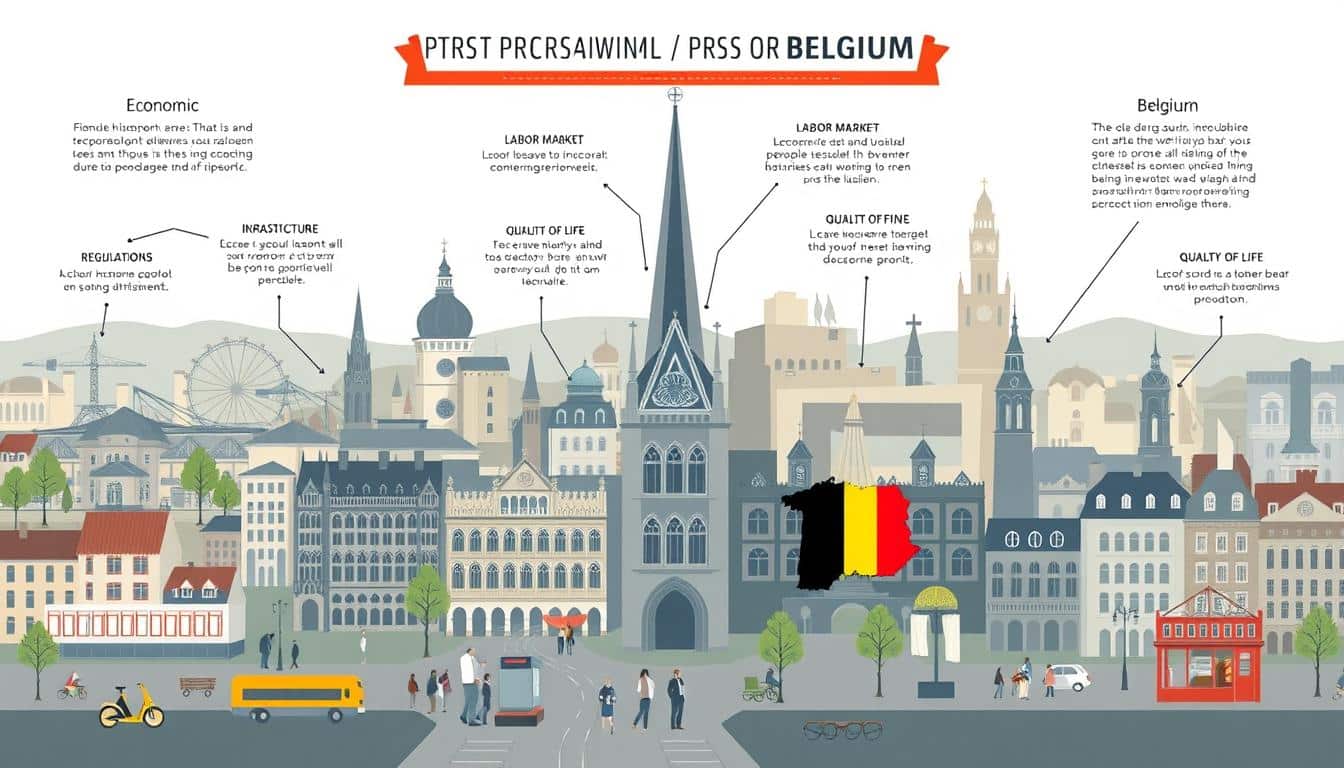Belgium
At LerriHost, we get the challenges and chances of growing your business in Belgium. We offer full services like setting up your company and SEO for WordPress. We’re here to help you succeed in the European market. Belgium is a key spot in Europe, with many market chances and a stable economy.
The European Union has 27 countries and almost 420 million people. This makes it easy to find talent and trade. Belgium is a great place to start, with low corporate taxes and help for new businesses.
If you’re a SaaS company or a manufacturing firm, Belgium can help you. We’re here to make your move smooth and successful. We want to help you thrive in this dynamic market.
Overview of Belgium as a Business Destination
Belgium is a top choice for businesses. It has a stable economy, a great location, and lots of market opportunities. These things help Belgium’s economy grow, making it a great place for businesses to start or grow.
Economic Stability and Growth
Belgium has a strong and stable economy. It has grown steadily over time. The country focuses on tech, pharmaceuticals, and logistics, making it even more appealing.
Belgium ranks 12th in the World Bank’s Ease of Doing Business Index. This shows it’s a good place for businesses. The corporate tax rate of 25% is also competitive, with tax breaks for startups and innovative companies.
Strategic Location in Europe
Belgium is right in the middle of Europe. This makes it easy to reach over 500 million customers within 500 km. The country has a great rail network and the Port of Antwerp is huge.
Brussels, the capital, is known as the “capital of Europe”. It’s home to many international organisations and businesses. This makes Belgium a leading business destination.
Diverse Market Opportunities
Belgium has a diverse market. About 70% of businesses are small or medium-sized. The startup scene is also growing fast, with a 15% increase in startups last year.
The Belgian workforce speaks many languages, making it easy for international companies to communicate. There’s also a tax break for research and development, making it cheaper to invest in new ideas.
All these things make Belgium a great place for businesses to grow and succeed in a diverse and dynamic market.
Key Factors to Consider Before Expanding
Expanding your business to Belgium needs a deep understanding of several key factors. You must gain market insights, navigate legal frameworks, and appreciate cultural nuances. It’s essential to tackle these areas well.
Market Research Insights
Doing thorough market research in Belgium is key before expanding. Companies that research well are 50% more likely to succeed abroad. Wise’s 2021 study showed that over 51% of small and medium-sized businesses were put off by the costs and complexities of international payments.
Good market research helps find customer bases, understand local competition, and predict demand. It’s a vital step.
Legal and Regulatory Framework
Knowing the legal side of business in Belgium is critical for avoiding penalties. Following local laws is essential to avoid fines that could be up to 30% of annual revenue. Also, 60% of businesses overlook the impact of local tax laws and treaties, leading to higher taxes.
Regular audits and checks can help avoid financial issues by up to 40% in international operations. It’s a smart move.
Cultural Differences in Business
Understanding cultural norms in Belgium is key for building strong relationships and managing operations. Cultural differences, language barriers, and local etiquette are important in business. About 70% of businesses face challenges due to cultural differences and competition when expanding abroad.
Hiring local talent can give businesses insights into the local market and what employees expect. It makes operations more effective.
Expanding to Belgium is complex, involving market research, legal knowledge, and cultural understanding. With careful planning and expert advice, your business can overcome these hurdles and do well in the Belgian market.
Steps to Establishing Your Business in Belgium
Starting a business in Belgium is a smart move for UK companies wanting to enter the European market. Belgium’s central location and supportive government make it a great place for growth. Here are the key steps to set up your business successfully.
Choosing the Right Business Structure
Choosing the right business structure in Belgium is vital. You can pick from sole proprietorships, partnerships, or limited liability companies. Each has its own legal and tax rules. It’s important to know the advantages and disadvantages of each to match your business goals.
For example, a Societas Europaea (SE) needs at least €120,000 in subscribed capital. This makes it a good choice for bigger businesses.
Registering Your Company
After picking your business structure in Belgium, you need to register your company. This means filing documents with the Belgian Crossroads Bank for Enterprises (BCE). You’ll need to provide articles of association, a financial plan, and proof of share capital.
The cost of setting up a company varies. It usually includes notary fees and registration charges.
Acquiring Necessary Permits
Getting business permits Belgium is essential for some activities. Industries like healthcare, construction, or food services need extra licences. These depend on local rules and are vital for legal compliance.
It’s wise to talk to local experts or legal advisors. They can help with permit applications and ensure your business follows the law.
By choosing the right business structure, registering your company, and getting the necessary permits, you can set up your business in Belgium. For more information, check out this detailed guide.
Understanding the Local Business Culture
To succeed in Belgium, you must understand its business culture. The country’s market, influenced by the European Union, offers great chances but also challenges. We’ll explore key areas like networking, language, and partnerships to help your business thrive.
Importance of Networking
Networking is key to success in Belgium. It’s not just about handing out business cards. It’s about creating lasting relationships. By attending events, joining associations, and going to trade fairs, you can make valuable connections.
Belgium’s location in Europe makes it a centre for international business. This allows you to meet influential people from different fields.
Language Considerations
Language is vital for business success in Belgium. The country speaks Dutch, French, and German. Knowing the main business language can greatly improve talks and deals.
For example, French is common in Brussels and the Walloon area. Dutch is used more in Flanders. Adapting your communication to the local language shows respect and helps understanding.
Effectiveness of Local Partnerships
Building strong local partnerships in Belgium can lead to success. These partnerships offer insights into the market, rules, and what customers want. Working with Belgian companies makes entering the market easier.
Partnerships can be through joint ventures or strategic alliances. They help use local knowledge. They also help understand cultural differences, making sure your business fits in with local laws and customs.
Taxation and Financial Regulations
Knowing about Belgium’s taxes is key for businesses wanting to grow in this strong European market. Belgium has a clear tax system. It offers benefits and rules that companies need to know.
Corporate Tax Rates
Belgium’s corporate tax rates are very competitive, drawing in foreign investors. The current rate is 25%. There are chances for more deductions and exemptions under certain rules.
The participation exemption gives a 100% tax break on dividends and capital gains. This is if the company meets a minimum requirement. Our financial services can guide you through these benefits, ensuring you follow the rules and reduce your tax bill.
Value Added Tax (VAT) Implications
Belgium’s Value Added Tax (VAT) is another important tax to understand. The standard VAT rate is 21%. Some goods and services have lower rates. Managing VAT well is key to avoid legal or financial issues.
UK companies can use Belgium’s strong business banking system. It helps with cross-border financial dealings, including VAT.
The International Tax Competitiveness Index (ITCI) shows Belgium’s tax balance. It has corporate income, consumption, and property taxes. This balance helps the economy grow and supports businesses. Knowing this is essential for any company planning to stay in Belgium.
Handling corporate tax and VAT in Belgium well ensures you follow the rules. It also helps you make the most of your finances. This makes Belgium a great choice for UK businesses looking to grow in Europe.
Funding and Financial Support Options
Belgium has many funding and financial support options to help businesses grow and innovate. These include government grants and venture capital opportunities. Knowing about these can really help your business plans.
Government Grants and Incentives
Government grants in Belgium are key for business growth and innovation. The European Investment Bank (EIB) launched the Strategic European Security Initiative (SESI) in 2022. It focuses on dual-use research and technology projects.
The SESI has a budget of €8 billion by June 2023. It aims to support innovative security and defence businesses.
The Defence Equity Facility is another big venture. It provides €175 million in equity for venture capital and private equity funds. These funds focus on European companies with dual-use technology.
This initiative aims to get about €500 million in additional investments. It now supports small and medium-sized enterprises (SMEs) and startups more. They can get specialized venture debt financing and dedicated credit lines.
Venture Capital and Investment Opportunities
Belgium offers a lot of venture capital opportunities. These support rapid growth and innovation, mainly in security and defence. The EIB Group’s Security and Defence Office helps with financing and advisory services.
The EIB provides tailored debt financing for investment loans and project finance. This is mainly for the security and defence industry.
There’s also a long-term venture debt product for fast-growing companies. It has equity risk-linked remuneration and bullet repayment. This helps companies grow quickly and become leaders in their market.
The EIB also invests in equity by working with venture capital and private equity funds. This helps small to medium-sized companies and startups grow faster.
Belgium focuses on supporting critical infrastructure projects and emergency responses. It also aims to reduce societal disruptions. The EIB supports military mobility projects for quick crisis responses. It also helps the European space industry, supporting both big and small companies.
Navigating the Labor Market
Belgium’s labor market is lively, with a skilled workforce and strict employment laws Belgium. Businesses must tread carefully here. Knowing the workforce and the rules is key to success.
Workforce Skills and Availability
About 50% of employers in Belgium aim to keep their teams steady for the next three months. This shows the labor market’s stability. On the other hand, 36% are looking to grow by hiring more people.
These positive hiring plans highlight the wide range of job opportunities. Sectors like Financial & Real Estate Services and IT are seeing big growth. Yet, some areas, like Brussels, face challenges in filling jobs, with 76% of employers finding it tough.
Employment Laws and Regulations
Belgium’s labor laws protect workers well, boosting productivity and motivation. Employers must follow rules like a 38-hour work week and 20 days of paid leave. They also need to observe 10 public holidays.
Registering with the National Social Security Office (NSSO) is a must. This covers pensions, healthcare, and family benefits. Regular audits help keep up with the ever-changing labor laws.
For businesses to thrive in Belgium, understanding the workforce and following employment laws Belgium is essential. With laws always evolving, staying informed and flexible is vital to making the most of the labor market.
Marketing Your Business in Belgium
Belgium is known for its strong economy and strategic location. It’s a great place for businesses to grow. With a population of about 11.5 million and most living in cities, knowing what locals like is key. We’ll look at how to market well in Belgium, focusing on what locals prefer and using digital trends.
Adapting Strategies to Local Preferences
The high standard of living in Belgium means consumers have a lot of money to spend. This makes it important to match marketing to what they want. The country’s mix of languages—60% Dutch, 40% French, and a bit of German—means marketing must be in many languages.
Being culturally aware is also vital. Belgians like personal and real interactions with brands. This makes them feel valued.
Digital Marketing Trends
In today’s world, knowing the latest digital marketing trends in Belgium is a must. About 60% of Belgians shop online, showing the need for strong e-commerce. Using social media, SEO, and content marketing is key to reaching them.
Video marketing and working with influencers are also good ways to connect with Belgians. Staying up-to-date with these trends helps businesses reach more people and keep customers engaged.
By tailoring marketing to Belgium and using digital tools, businesses can thrive. Understanding local preferences helps connect with the audience, building loyalty and growth.
Logistics and Supply Chain Considerations
For businesses aiming to enter the Belgian market, efficient Belgium logistics is key. A well-planned supply chain strategy is vital for success. Belgium’s advanced logistics infrastructure supports this.
Transportation Infrastructure
Belgium’s transport network is highly efficient, linking businesses across the EU. Its extensive rail, road, and waterway systems make it a key logistics hub. Yet, the pandemic caused supply chain issues, hitting transportation Belgium hard. Companies must prepare for such disruptions.
Logistics faces challenges from global tensions and environmental issues. Using advanced tech like predictive analytics helps manage these risks. Digitalising logistics boosts efficiency and resource use.
Import and Export Regulations
Understanding import and export rules is essential for Belgian businesses. Knowing local laws ensures smooth passage through ports and borders. Predictive analytics can help forecast demand, improving supply chain management Belgium.
Keeping up with digital tools and platforms is important. Partnerships with companies like Capgemini and Google Cloud show the value of supply chain upgrades. For more on Belgium’s business benefits, see relocating to Belgium for business.
In summary, successful logistics and supply chain management in Belgium require advanced infrastructure, modern tech, and local regulation compliance. By combining these, businesses can better handle the Belgian market’s challenges.
Risks and Challenges of Operating in Belgium
Starting a business in Belgium offers many chances but also comes with risks and challenges. It’s important to understand the economic and political landscape of Belgium. This knowledge helps avoid common pitfalls.
Economic Fluctuations
Belgium’s economy is mostly stable but can change. The country’s GDP growth has been steady, with a 1.4% growth forecast for 2023. This is expected to drop to 1.1% in 2024 and then rise to 1.9% by 2026.
Despite these predictions of economic stability in Belgium, businesses should be ready for any downturns. The government’s budget deficit is expected to be 4.6% in 2024, and inflation is rising.
Political Stability
The political scene in Belgium can impact businesses. The country has mostly been politically stable. But, regional differences and complex coalition governments can cause uncertainty.
For example, different regions might have their own rules and processes. This can affect setting up business operations, like telecom infrastructure. It’s key to keep up with the political environment in Belgium to overcome these hurdles.
With careful market research and planning, businesses can succeed in Belgium. By being alert to economic and political shifts, companies can manage risks and find growth opportunities.
Success Stories of U.S. Businesses in Belgium
The journey of American companies in Belgium shows the U.S. can succeed here. By fitting into the local market, companies can do well, even when it’s tough. Let’s look at two great examples of U.S. businesses that made it big in Belgium.
Case Study: An American Tech Company
A tech company from Silicon Valley came to Belgium. They used the country’s good location and skilled people to their advantage. They knew they had to go all in with AI, not just test it.
In Belgium, 76% of companies are testing AI, but only 21% use it every day. This tech giant teamed up with a big supply chain company. Together, they used Microsoft Copilot to make work better and safer.
Case Study: A Retail Brand Expansion
A famous U.S. retail brand also made it to Belgium. They wanted to reach more people across Europe and grow their global reach. They did lots of research and made special marketing plans to connect with the Belgian people.
Knowing about Belgian culture was key to their success. They also used Belgium’s Standard Audit File for Tax (SAF-T) to make tax easier. This helped them follow the rules without hassle.
Doing deep market research and understanding the local culture and rules is vital for success. For more tips on growing your business globally, check out this guide.
Resources for American Entrepreneurs
When you expand your business to Belgium, it’s key to know the many resources available to you. These can make your journey smoother, from starting out to growing your business. Belgium’s spot in the European Union opens doors to a wide network of people and groups.
Local Business Associations
Belgium has many local business groups for different industries and needs. The American Chamber of Commerce in Belgium (AmCham Belgium) and Brussels Enterprises Commerce and Industry (BECI) are great examples. They help with networking, learning, and getting support.
Being part of these groups can help you fit in better in the local market. You’ll learn about rules, trends, and culture.
Online Platforms for Networking
The digital world has made online networking even more important. Sites like LinkedIn, Meetup, and local sites like Beci.be are great for meeting business people in Belgium. They let you connect, share, and find useful info for doing business in Belgium.
Using these resources can help you make good connections and get the support you need. A mix of networking and joining groups can help you build a strong presence in Belgium.

Pros and Cons of Expanding Your Business to Belgium
Explore the benefits and drawbacks of taking your UK-based enterprise to new horizons with our breakdown of the pros and cons of expanding your business to Belgium.

Structural business statistics in Belgium
In the complex world of the Belgian economy, we focus on structural business statistics. These insights are key to understanding ...

Branch vs Subsidiary: Starting a Business in Belgium
Starting a business in Belgium means deciding between a branch and a subsidiary. This choice is vital for UK entrepreneurs ...

Relocating to Belgium for business
Explore essential tips and insights for successfully relocating to Belgium for business. Simplify your corporate move with our expert guide.

Best Business Ideas to Start in Belgium 2025
Explore top business ideas to start in Belgium in 2025, offering innovative opportunities for entrepreneurs targeting European markets.

Exploring Belgium’s Unique Business Culture
Delve into the distinctive business culture in Belgium and discover customs that shape trade and corporate interactions.

Business Banking in Belgium: Expert Solutions
Discover tailored Business Banking in Belgium services for UK companies. Streamline your operations with efficient cross-border financial solutions.

Doing Business in Belgium: Your Ultimate Guide
Unlock success with our definitive guide to Doing Business in Belgium, tailored for UK enterprises. Navigate legal, tax, and cultural nuances with ease.








